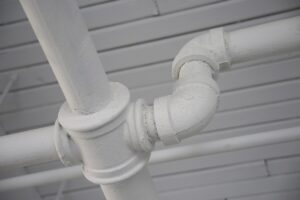Plumbing
The Ultimate Guide to Choosing the Best Pipes for Your Home’s Plumbing System

Selecting the most appropriate pipes to incorporate into your home plumbing system is such a vital decision that will make it effective as well as durable. There are numerous types of pipes in the market, and every single one of them is unique in terms of features and utility, so the selection seems to be such a tough call. This book will help you do this, providing you with the information you need to allow you to make the right choice and have an efficiently installed and quality home plumbing system. Learning the Basics: Variables That Will Determine Pipe Selection
Understand what will impact your choice prior to reading about every type of pipe. They are water pressure, temperature, resistance to chemicals, durability, and price. Think about your house layout, regional weather, and individual requirements of every plumbing system, i.e., supply of hot water, drainage, or cold-water supply.
Copper Pipes
Two of the most popular types are rigid copper pipe, which is soldered, and flexible copper pipe, which is joined with compression fittings. Although copper is more costly, its strength and longevity will typically pay for itself in the long term with the greater initial expense. Yet, in highly acidic water, caution must be exercised or other material must be utilized. PVC Pipes
The Cost-Effective and Versatile Solution Polyvinyl chloride (PVC) piping is utilized extensively in cold-water supply and drain. The piping is simple to repair, it is lightweight, and it has good chemical and corrosion resistance. The PVC piping is inexpensive, and because of its affordability, it is widely used for use within residential units. It is not suitable, however, for use in hot water as it warps or becomes deformed using heat with ease.
CPVC Pipes: Resistance to Hot Water at High Temperatures
Chlorinated polyvinyl chloride (CPVC) pipe is PVC-type pipe with the added benefit of being resistant to high temperatures. It’s usually installed as cold and hot water distribution pipes and provides good economy to life. CPVC pipe is chemical corrosion resistant and damage proof and, thus, is a repeat selection for most plumbing applications.
PEX Pipes: The Flexible and Convenient Solution
Cross-linked polyethylene (PEX) pipe gained popularity during the last decades or so because it is flexible, easy to install, and freeze-proof. PEX pipe is flexible and will coil around objects, so they do not require as many fittings and there will be less room for leaks. PEX pipe can be utilized for hot water and cold-water supply lines and contains color coding between hot and cold-water lines to identify.
Galvanized Steel Pipes: The Sturdy but Old Solution
Galvanized steel pipes, once prevalent, are not used nearly to the same extent in new construction today because they corrode and mineralize. Although galvanized steel pipes are extremely hardy and will never rot, eventually they will block the flow of water and lead-contaminate the water system. If your home is so constructed, replace your galvanized steel pipes because more effective and safer alternatives have been made available.
ABS Pipes: The Reliable Venting and Drainage Solution
Acrylonitrile butadiene styrene (ABS) pipes have broad application in drainage, waste, and vent (DWV) systems. ABS pipes are chemically resistant, light but tough. ABS pipes are easy to install and possess highly desirable flow characteristics. ABS pipes are unsuitable, however, for potable water supply use.
Cast Iron Pipes: The Heavy-Duty Underground Solution
Cast iron pipes are very strong and good dampers with good strength and are widely used in sewerage and drainage underground pipes, where their strength and their weight cannot be surpassed. Cast iron pipes are long-lasting but not only are they very heavy, but even special laying methods have to be employed.
Correct Pipe Sizing: Selecting the Right Pipe Size for You
The correct selection of pipe size is required to provide adequate water pressure and flow in your home. Pipes that are too small will restrict water flow, and pipes that are too large will wastefully use water. Let a professional plumber select the correct pipe sizes for your specific plumbing requirements.
Factors of Installation: Promoting Correct and Safe Installation
You will have the option to determine how long and safely your plumbing system will serve with proper installation. Ease of installation, construction material and method employed, and cost of professional installation should be taken into consideration while choosing your pipes. You are recommended to have a licensed plumber install your plumbing system for safe and effective installation if you lack experience in plumbing.
Long Term Maintenance
Maintenance of your chosen pipes is equally critical. Everything can be prevented by regular inspection. You may need to flush your water pipes occasionally if you utilize water that contains a high mineral content.
Conclusion
By being extremely cautious about these factors and making proper research of the different pipes present in the market, you can choose the most appropriate pipes for the plumbing system of your house that will be free of problems and function with ease for years.














